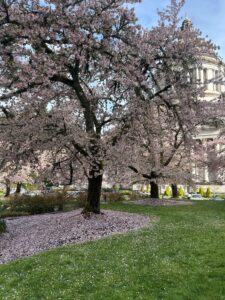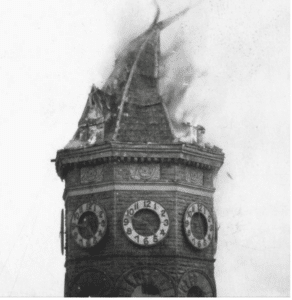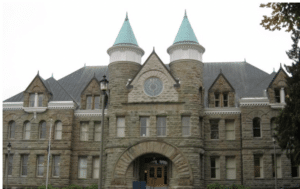
Spring arrives on the Capitol Campus
(Photo Courtesy: Erica Hallock)
Trivia!
What event on Saturday, September 9, 1928, caused massive damage to the Old Capitol Building in Downtown Olympia?
Highlights of the Week
Early Learning Facilities Bill Signed Into Law!
On Monday, April 7, Governor Bob Ferguson signed HB 1314 (Callan/Abbarno) into law. The Senate companion bill was sponsored by Senators Trudeau and Torres.
The bill makes four primary changes to the Early Learning Facilities (ELF) Fund:
- Establishes an emergency grant program for projects necessitated by unforeseen circumstances (such as burst pipes).
- Eases the burden on financially constrained providers by moderating matching fund requirements.
- Makes Tribal Compact Schools eligible for the ELF Public School Districts Program.
- Clarifies that projects supporting the conversion of ECEAP slots to full day and/or extended day are eligible for ELF Fund programs.
The law goes into effect July 27, 2025.
Opposite Fiscal Committee Cutoff Deadline – Back to Floor Action
Final Stretch! Fiscal committee action concluded on Tuesday, April 8 with the deadline for fiscal committees to act on bills from the opposite body. On Wednesday, activity shifted back to the Legislative Building for what feels like endless Floor sessions in advance of the April 16 “Opposite House Cutoff.” At the same time legislators are deliberating the final lists of bills, budget writers are negotiating budget details.
Given the hours spent standing on unforgiving marble floors, I, for one, am glad fashionable tennis shoes are considered acceptable footwear.
Bill Updates
Bill to Modify Fair Start for Kids Act Advances
The House Appropriations Committee took executive action on ESSB 5752 (C. Wilson) on its final day of committee work, April 8. This bill looks to modify aspects of the Fair Start for Kids Act to achieve cost savings given the state’s budget constraints. See the March 28 Notes from Olympia for further background on the bill’s details.
Prior to executive action, the Appropriations Committee adopted further amendments that serve to further align the bill with the House’s approach to child care in its proposed budget.
Specifically, the amendments:
- Reinstate current law requiring a household’s 12-month Working Connections Child Care authorization begin on the date care is expected to start by removing provisions directing DCYF to adopt rules requiring prospective payments and prohibiting prospective payments for a child who has not attended within the previous month.
- Modify the school-age pilot project contained in the bill.
The bill now moves to House Rules.
Bill to Modify Child Care Qualifications Passes Senate
On April 8, the Senate passed E2SHB 1648 (Dent) by a unanimous vote. Among other provisions, this bill extends the timeline for childcare providers to meet certain staff qualification requirements from August 1, 2026, to at least August 1, 2030.
See Start Early’s March 28 Notes from Olympia for a description of the bill’s components.
Because the bill was amended in the Senate, it needs to return to the House for concurrence in House amendments.
Transition to Kindergarten Pause Advances to House Rules
On Tuesday, April 8, the House Appropriations Committee took executive action on ESB 5769 (Wellman). This bill would limit Transition to Kindergarten (TTK) enrollment to the level appropriated in the operating budget. (Note both the Senate and House proposed budgets effectively pause TTK enrollment at 2024-25 school year levels).
The bill also requires the Office of the Superintendent of Public Instruction to work with the Department of Children, Youth and Families to develop recommendations to phase-in TTK enrollment that takes into consideration other early learning programs, including ECEAP, and also limits annual growth to no more than five percent.
The bill calls for the recommendations to consider the following for TTK expansion:
- Communities with the highest percentage of unmet needs;
- Child care supply and demand;
- School districts, charter schools, and state-tribal education compact schools with the highest percentages of students qualifying for free and reduced-price lunch;
- School districts, charter schools, and state-tribal education compact schools with the highest percentages of students with disabilities; and
- School districts, charter schools, and state-tribal education compact schools with the lowest kindergarten readiness results on the Washington kindergarten inventory of developing skills.
Amendments adopted in the House Appropriations Committee make two changes to the underlying bill:
- For the 2025-26 and 2026-27 school years, directs OSPI to prioritize TTK programs that operated during the 2024-25 school year.
- Changes the due date for the OSPI/DCYF recommendations from December 1, 2027, to December 1, 2026.
The bill now moves to the House Rules Committee.
Check out Start Early’s Bill Tracker for the latest on early learning related bills.
Senate and House Capital Budget Negotiations Commence
On Friday, April 4, the House Capital Budget Committee passed its Capital Budget, SHB 1216 (Tharinger). On Saturday, April 5, the Senate passed its Capital Budget, SSB 5195 (Trudeau) with all Senators present voting in favor. In contrast to the Operating Budget, the Capital Budget is definitely a more bi-partisan affair with budget leads in the Senate touting how the budget serves “One Washington” and giving public nods of appreciation to their counterparts from the other sides of the aisle.
At the House Capital Budget Committee meeting, Chair Tharinger reported the House would not take up the Capital Budget until negotiations are complete. At that time, the compromise will be considered as a striking amendment by the House before it is sent to the Senate.
As a reminder, Start Early developed a document comparing the Senate and House Operating and House budget proposals. It has been updated to reflect the latest Capital and Operating budget action to date.





